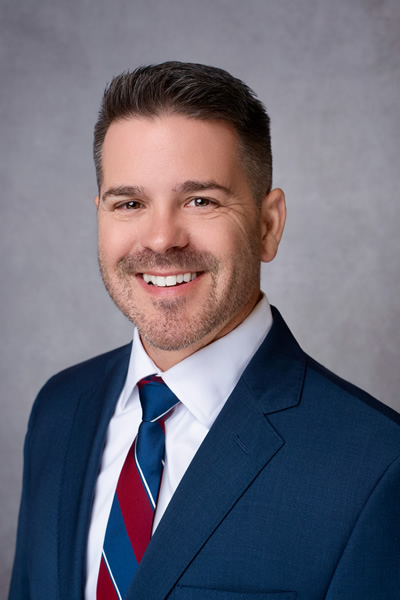School of Kinesiology Faculty Named First-Ever Recipient of the Marsha Grant-Ford EDAC Distinguished Research Award by the National Athletic Trainers’ Association
July 31, 2025

Shane Caswell
Shane Caswell, professor in the Athletic Training Education Program within the School of Kinesiology at George Mason University, was recently honored as the first-ever recipient of the Marsha Grant-Ford EDAC Distinguished Research Award from the National Athletic Trainers’ Association (NATA). The award, presented by the NATA Ethnic Diversity Advisory Committee (EDAC), recognizes outstanding excellence in research and authorship related to ethnically diverse athletic trainers, patient populations, and health issues disproportionately affecting diverse communities. Widely considered to be one of the highest honors within the athletic training community for scholarship that advances all-inclusive diversity, this award highlights the profession’s dedication to providing culturally competent care and tackling health disparities through comprehensive research. Caswell was presented with this award at a ceremony held June 26, 2025, during the EDAC Town Hall that was part of the 76th NATA Clinical Symposia & AT Expo in Orlando, Florida.
Upon learning that he had been named the inaugural winner of this award, Caswell expressed his deep appreciation for this recognition. “I am truly honored and extremely grateful to receive the inaugural Marsha Grant-Ford EDAC Distinguished Research Award from the NATA Ethnic Diversity Advisory Committee,” he stated. “Dr. Grant-Ford is a remarkable pioneer whose inspiring legacy of excellence, representation, and service has paved the way for so many.”
In being named the recipient of this prestigious award, Caswell was cited for the innovative research he has conducted for more than the past decade—work which has culminated in several impactful, community-based initiatives aimed at effectively managing and preventing injuries to youth who play sports. Caswell’s notable achievements include his leadership of the Advancing Healthcare Initiatives for Underserved Students (ACHIEVES) Project. To date, the ACHIEVES Project has expanded access to sports medicine care for well over 200,000 middle school children. Through this initiative, Caswell played an instrumental role in the creation of a pediatric sports medicine fellowship that has trained more than 50 licensed athletic trainers. He also facilitated the development of systems for standardized injury surveillance in diverse school communities, which are essential to assessing the effectiveness of injury prevention practices.
In his other contributions, Caswell was recognized for his ongoing leadership of a multidisciplinary team of experts through the Virginia Concussion Initiative (VCI)—a statewide partnership formed with the Virginia Department of Health. In this role, Caswell and his team have been instrumental in helping to improve brain health awareness and concussion management for over 1.7 million school-aged children. Among the tools and resources provided by the VCI is the groundbreaking Neurodiversity Toolkit, which is an exemplary model for supporting equitable concussion care.
Collectively, the efforts described here have informed policies, advanced culturally responsive care, and facilitated national rules and equipment changes aimed at preventing head injuries and improving outcomes after concussion.
Caswell shared his thoughts on what it means to him to be named the first-ever recipient of the Marsha Grant-Ford EDAC Distinguished Research Award. He stated, “Being chosen as the inaugural recipient of this award is both deeply humbling and profoundly meaningful. It is an extraordinary honor to have this work recognized, especially under an award that bears Dr. Marsha Grant-Ford’s name—someone whose pioneering contributions continue to inspire and elevate our profession.”
Reflecting on the importance of research in athletic training, Caswell commented, “Research is the foundation for advancing athletic training practice, policy, and education. It allows us to identify gaps, develop tailored interventions, and ensure that care is both evidence-based and culturally responsive.”
“Throughout my career,” he continued, “I have focused on research that improves access to care and outcomes for pediatric and underserved populations. Whether through large-scale injury surveillance, culturally sensitive concussion assessments, or mentoring the next generation of athletic trainers, my goal has been to produce meaningful data that can directly enhance health equity and inform best practices.”
When asked about what he sees as the most important challenges and opportunities now facing the athletic training profession, Caswell pointed to the evolving needs of an increasingly diverse patient population, something which he believes should guide the direction of future research. He stated, “Moving forward, I believe research should prioritize understanding and addressing social determinants of health, developing culturally and linguistically appropriate models of care, and improving health equity metrics. Additionally, we need more research focused on supporting neurodiverse individuals and tailoring concussion management protocols to their unique needs. By pursuing these priorities, we can ensure that athletic training remains an essential, inclusive part of the broader healthcare landscape.”
Caswell took a moment to acknowledge and thank members of the School of Kinesiology community at George Mason with whom he works. He stated, “I am acutely aware that none of this would have been possible without the many dedicated students, colleagues, mentors, and community partners who have contributed their time, expertise, and passion to this work. I share this recognition with all of them. Their unwavering support has been instrumental in advancing these efforts to promote equity and improve health outcomes in diverse communities. I am sincerely thankful for their collaboration and support.”
In his closing remarks, Caswell pledged his commitment to continued research that will increase diversity in the athletic training profession and optimize health outcomes for individuals in underserved communities. He commented, “I will do my best to follow the example of Dr. Grant-Ford by continuing to advance research and outreach that uplifts underserved and underrepresented communities and supports the development of ethnically diverse athletic trainers.”
Please join the College of Education and Human Development community in congratulating Shane Caswell on being selected for the prestigious Marsha Grant-Ford EDAC Distinguished Research Award from the National Athletic Trainers’ Association. This honor reflects the high caliber of the research contributions he has made throughout his career in support of the discipline of athletic training.
